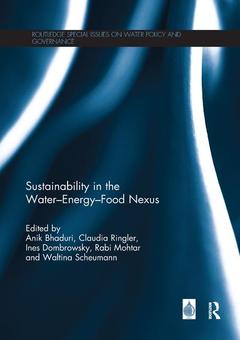Description
Sustainability in the Water-Energy-Food Nexus
Routledge Special Issues on Water Policy and Governance Series
Coordinators: Bhaduri Anik, Ringler Claudia, Dombrowsky Ines, Mohtar Rabi, Scheumann Waltina
Language: English
Subject for Sustainability in the Water-Energy-Food Nexus:
Keywords
WEF Nexus; Water Energy Food Nexus; Water International; Energy Policy; Resources; Nexus Approach; Resource Consumption; Energy Sources; Development; Antofagasta Region; Energy; Da Ta; Tradeoffs; Data; SDGs; Hydrological Ecosystem Services; Policy Integration; Global Change Drivers; Sustainability; Groundwater Depletion; Ecosystem; Rogun Dam; Xayaburi Dam; MRC Secretariat; Modern Bioenergy; Duero River Basin; Time Invariant Explanatory Variables; Te Ch; Amu Darya Basin; IWRM Process; IWRM Implementation; Lea County; Aral Sea Basin; Institutional Interplay; Spatial Fit
Publication date: 10-2018
· 17.4x24.6 cm · Paperback
Publication date: 12-2016
· 17.4x24.6 cm · Hardback
Description
/li>Contents
/li>Readership
/li>Biography
/li>
It is beyond doubt that the interconnectedness between food, energy, water security and environmental sustainability exists and is getting amplified with increased globalization. It has been recognized that efforts to address only one part of a systemic problem by neglecting other inherently interlinked aspects may not lead to desirable and sustainable outcomes. In this perspective, policy- and decision- making requires a nexus approach that reduces trade-offs and builds synergies across sectors, and helps to reduce costs and increase benefits for humans and nature compared to independent approaches to the management of water, energy, food and the environment. In the past, work related to the Nexus has looked at the interactions between water and food or water and energy, but there has been a reluctance to bring forward a broader systematic perspective that captures the multiple sectors and resource dependencies while understanding its cost to the environment if we neglect these linkages. This book is a compilation of thirteen papers published previously as a special issue of Water International, contains significant pieces of work on the W-E-F nexus focusing on relevant tools, solutions and governance at local and broader human scales.
Introduction Sustainability in the water–energy–food nexus 1. The impact of water users’ associations on the productivity of irrigated agriculture in Pakistani Punjab 2. Water–energy–food (WEF) Nexus Tool 2.0: guiding integrative resource planning and decision-making 3. Bioenergy, food security and poverty reduction: trade-offs and synergies along the water–energy–food security nexus 4. Application of a water–energy–food nexus framework for the Duero river basin in Spain 5. Reuse of oil and gas produced water in south-eastern New Mexico: resource assessment, treatment processes, and policy 6. Water–energy–food nexus in a transboundary context: the Euphrates–Tigris river basin as a case study 7. Water–food–energy nexus in Chile: the challenges due to global change in different regional contexts 8. How would the Rogun Dam affect water and energy scarcity in Central Asia? 9. Governance of transitions towards sustainable development – the water–energy–food nexus in Cyprus 10. The water–energy–food (WEF) security nexus: the policy perspective of Bangladesh 11. Where is the power? Transnational networks, authority and the dispute over the Xayaburi Dam on the Lower Mekong Mainstream
Anik Bhaduri, Sustainable Water Future Programme, Brisbane,Australia
Claudia Ringler, International Food Policy Research Institute
Ines Dombrowsky, German Development Institute / Deutsches Institut für Entwicklungspolitik (DIE)
Rabi Mohtar, Texas AM University, USA
Waltina Scheumann , German Development Institute / Deutsches Institut für Entwicklungspolitik (DIE)




